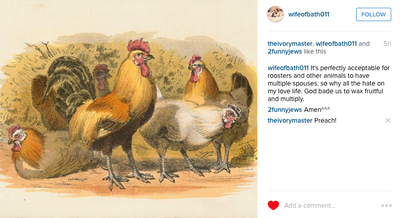The Wife of Bath Interview (commonplace book)
|
|
Why an Interview?The Wife likes to showcase her looks as well as express her thoughts. An interview satisfies both of these conditions because she gets to dress up for the camera and talk about all about her thoughts on the Nun's Priest Tale. n
|
Welcome
Overview of Wife of Bath
Chaucer presents the Wife as a very sensual woman, with large hips, a gap-tooth, and bold, flashy clothes. The Wife would not deny this description of herself because she is a proud, confident woman who enjoy compliments. However, the Wife is much more than a pretty face. Watch the video or check out the Instagram to find out who the Wife really is!
Instagram (autobiography)Get to know the Wife of Bath!
Essay |
Why Instagram?Like the interview, an Instagram allows the Wife to exhibit herself and put forth her opinions. What better way to attract eyes than a social media site all about pictures?
|
The Wife of Bath is a very complex and multifaceted character. While Chaucer describes the Wife as very sensual and having many partners, the Wife views herself as more than a pretty face, although she has no problem with compliments on her allure. If given the chance to create an autobiography and commonplace book using 21st century technology the Wife of Bath would gravitate towards something that allows her to showcase herself, her life, and her opinion to the world. An Instagram and an interview meet all of these conditions.
The idea of an Instagram entices the Wife of Bath because she can showcase her life and opinions to the world. Her opinionated attitude is portrayed through her posts on marriage, virginity, and sovereignty. In one of her posts, the Wife distinctly implies that she will have sex with a man she just met simply because he bought her Starbucks. The reasoning for this post came from the Wife’s prologue. She asserts that “in wifhood wol I use myn instrument / As freely as my Makere hath it sent” (The Wife of Bathe’s Prologue and Tale 155-156). Through this statement one observes that the Wife is completely comfortable offering up her own body in exchange for whatever she wants, money, attention, Starbucks, etc. In her tale’s prologue, the Wife also addresses her views on the relationship between a husband a wife. She states that, “I have the power durynge al my lyf / Upon his propre body, and noght he. / Right thus the Apostel tolde it unto me, / And bad oure housbondes for to love us weel. (The Wife of Bath’s Prologue and Tale 164-167). In other words, the Wife believes that while she married, she has power over her husband’s body, not he, and that the husband should love his wife well. She backs up her bold statement be referencing the Apostles. However, she coincidentally leaves out the other part of the Apostle’s saying that the wife should also love her husband well. This reveals two important aspects of the Wife: one, she likes to be the dominant one in a relationship; and two, she alludes to Biblical stories to portray herself as a religious woman, but she only uses the parts that favor her own views. Two of her instagram posts illustrate these attributes. One is a text post which basically states the same thing the Wife said, but in less audacious terms, and the other is a picture of a rooster and his harem with the caption containing the words “God bade us wax and multiply.” A few of the other posts depict the Wife with other people, usually men, with the captions related to loving life, having fun with friends, or meeting new people. These posts demonstrate the Wife’s enjoyment in social activities and, perhaps as a side project, searching for future husbands. Chaucer himself corroborates that “in felaweshipe wel coulde she [the Wife] laughe and carpe” (The General Prologue 476). In other words, the Wife is great company and often makes people laugh. A few of the other posts depict the Wife with other people, usually men, with the captions related to loving life, having fun with friends, or meeting new people. These posts demonstrate the Wife’s enjoyment in social activities and, perhaps as a side project, searching for future husbands. Chaucer himself corroborates that “in felaweshipe wel coulde she [the Wife] laughe and carpe” (The General Prologue 476). In making this comment, Chaucer acknowledges that the is Wife great company and often makes people laugh. Every post the Wife makes illuminates a different facet of her personality. She is very opinionated and speaks her mind with no filter. She craves power and love, and is willing to do whatever it takes to satisfying those needs.
The Wife of Bath’s character was ideal for an interview on camera to capture her reaction to the Nun’s Priest Tale. She is very confident and likes to be seen, making capturing the essence of her character and personality on camera a good idea and quite frankly essential. Posting periodically on twitter would not have yielded the same result because of the lack of emotion and the inability to give a concrete opinion on something in a small text box. The Wife is very talkative, so putting her in front of a camera allowed her to express all her feelings easily, clearly, and talk as much as she needed to about the tale and express her reaction and her thoughts on it. The idea of the interview didn’t come from anything specific and was just suggested by one of the group members, but turned out to be the right choice and the video turned out great itself.
The idea of an Instagram entices the Wife of Bath because she can showcase her life and opinions to the world. Her opinionated attitude is portrayed through her posts on marriage, virginity, and sovereignty. In one of her posts, the Wife distinctly implies that she will have sex with a man she just met simply because he bought her Starbucks. The reasoning for this post came from the Wife’s prologue. She asserts that “in wifhood wol I use myn instrument / As freely as my Makere hath it sent” (The Wife of Bathe’s Prologue and Tale 155-156). Through this statement one observes that the Wife is completely comfortable offering up her own body in exchange for whatever she wants, money, attention, Starbucks, etc. In her tale’s prologue, the Wife also addresses her views on the relationship between a husband a wife. She states that, “I have the power durynge al my lyf / Upon his propre body, and noght he. / Right thus the Apostel tolde it unto me, / And bad oure housbondes for to love us weel. (The Wife of Bath’s Prologue and Tale 164-167). In other words, the Wife believes that while she married, she has power over her husband’s body, not he, and that the husband should love his wife well. She backs up her bold statement be referencing the Apostles. However, she coincidentally leaves out the other part of the Apostle’s saying that the wife should also love her husband well. This reveals two important aspects of the Wife: one, she likes to be the dominant one in a relationship; and two, she alludes to Biblical stories to portray herself as a religious woman, but she only uses the parts that favor her own views. Two of her instagram posts illustrate these attributes. One is a text post which basically states the same thing the Wife said, but in less audacious terms, and the other is a picture of a rooster and his harem with the caption containing the words “God bade us wax and multiply.” A few of the other posts depict the Wife with other people, usually men, with the captions related to loving life, having fun with friends, or meeting new people. These posts demonstrate the Wife’s enjoyment in social activities and, perhaps as a side project, searching for future husbands. Chaucer himself corroborates that “in felaweshipe wel coulde she [the Wife] laughe and carpe” (The General Prologue 476). In other words, the Wife is great company and often makes people laugh. A few of the other posts depict the Wife with other people, usually men, with the captions related to loving life, having fun with friends, or meeting new people. These posts demonstrate the Wife’s enjoyment in social activities and, perhaps as a side project, searching for future husbands. Chaucer himself corroborates that “in felaweshipe wel coulde she [the Wife] laughe and carpe” (The General Prologue 476). In making this comment, Chaucer acknowledges that the is Wife great company and often makes people laugh. Every post the Wife makes illuminates a different facet of her personality. She is very opinionated and speaks her mind with no filter. She craves power and love, and is willing to do whatever it takes to satisfying those needs.
The Wife of Bath’s character was ideal for an interview on camera to capture her reaction to the Nun’s Priest Tale. She is very confident and likes to be seen, making capturing the essence of her character and personality on camera a good idea and quite frankly essential. Posting periodically on twitter would not have yielded the same result because of the lack of emotion and the inability to give a concrete opinion on something in a small text box. The Wife is very talkative, so putting her in front of a camera allowed her to express all her feelings easily, clearly, and talk as much as she needed to about the tale and express her reaction and her thoughts on it. The idea of the interview didn’t come from anything specific and was just suggested by one of the group members, but turned out to be the right choice and the video turned out great itself.





